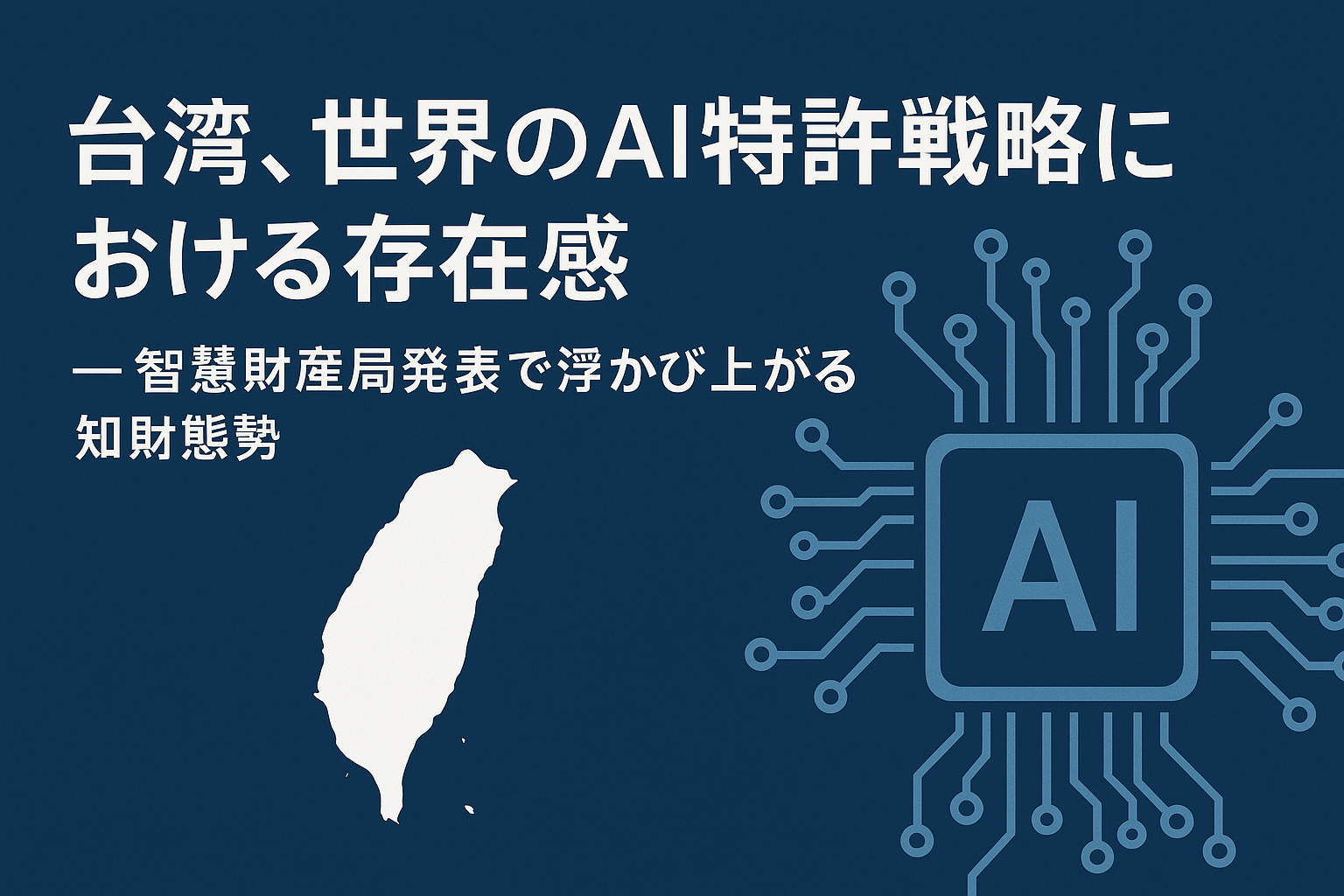Key Points and Significance of the News
According to a report released on the 23rd by the Intellectual Property Office under Taiwan’s Ministry of Economic Affairs, Taiwan ranked ninth in the world in terms of patent applications related to artificial intelligence (AI).
This news goes beyond mere ranking. From the Bureau’s comment that “Taiwan is becoming a global hub in AI intellectual property strategy,” we can infer a deliberate and strategic intent.
As global competition over IP and patents intensifies, the fact that a “mid-sized” nation like Taiwan ranks among the top in AI patent filings is noteworthy for Japanese IP professionals, research institutes, and companies alike.
The following sections explore why Taiwan has secured this position from multiple perspectives: data, policy, and industrial structure.
Taiwan Ranks 9th in the World — Data and Background
Using its Global Patent Search System (GPSS), the Bureau categorized AI-related technologies into eight fields: AI hardware, knowledge processing, machine learning, evolutionary computation, computer vision, natural language processing, speech, and planning/control.
The data show that since 2017, AI-related filings in Taiwan have surged dramatically — by 2021, the number was roughly nine times that of 2014. In particular, Taiwan ranked 8th globally in machine learning patents and 9th in computer vision patents.
This trend aligns with the global surge in AI patent filings over the past decade.
However, it is important to interpret Taiwan’s “ninth place” not just by ranking, but through the lens of growth rate, specialization, and the composition of key players.
Which Fields Are Growing: Focus on Machine Learning and Computer Vision
Among the eight fields analyzed, Taiwan’s filings were particularly strong in machine learning and computer vision, both globally dominant domains within AI patenting.
The field of computer vision encompasses technologies such as camera and sensor systems integrated with deep learning–based recognition — areas closely aligned with Taiwan’s strengths in semiconductors and electronic manufacturing services (EMS).
This suggests that Taiwan’s patent growth stems not only from volume but from an integrated dual axis: hardware/manufacturing (industrial base) plus AI software/algorithms — a hybrid model driving Taiwan’s AI innovation.
Main Applicants and the Industry–Academia–Government Framework
The news highlights leading applicants from Taiwan, including:
- Hon Hai Precision Industry (Foxconn) — 1st place
- Industrial Technology Research Institute (ITRI) — 2nd
- Chunghwa Telecom — 4th
- Institute for Information Industry (III) — 7th
- Inventec Corporation — 9th
This lineup illustrates that manufacturing/EMS industries and government/public research institutions are key drivers of AI-related patent activity.
It also reflects a uniquely Taiwanese model of “manufacturing + intelligence,” in which AI technologies like machine learning and computer vision are layered atop robust hardware foundations.
Why Taiwan? — Geographic, Industrial, and IP System Perspectives
Several intertwined factors explain Taiwan’s position in AI patent competitiveness:
- Manufacturing/EMS Strengths
Taiwan hosts globally significant semiconductor and EMS industries. Its strengths in hardware design, production, and mass manufacturing directly feed into AI hardware and computer vision applications.
- IP System and Policy
Taiwan’s Intellectual Property Office (TIPO) has been actively developing guidelines and policies to address AI and digital technologies, aiming to modernize its IP framework for emerging fields.
- Industry–Academia–Government Collaboration
The fact that public research institutions are among the top patent filers underscores strong governmental support, strategic investment in R&D, and a cultivated IP mindset.
- Global Hub Positioning
Geographically, Taiwan sits at the core of the Asian semiconductor and manufacturing chain, well-positioned to act as a hub in the global AI patent network.
Thus, Taiwan’s rise is not simply about the number of filings, but the synergistic interaction of its industrial base, institutional infrastructure, and geographic advantage.
Comparative View: Japan, Other Asian Countries, and the Global Context
While Taiwan’s 9th-place ranking is striking, comparing its position globally provides further insight.
AI patent applications worldwide have surged, with leading nations rapidly expanding their portfolios. According to one report, Taiwan already held over 10,000 AI-related patents by 2020 — a significant figure relative to its size.
However, qualitative aspects — such as citation frequency, international expansion, and patent grant rates — vary widely among countries. Taiwan continues to develop its legal stance on emerging IP issues such as AI as an inventor and protection of AI-generated works.
For Japan’s IP and R&D communities, Taiwan’s progress signals an intensifying regional IP competition right next door.
Future Focus: IP Risks and Strategic Intentions
Key points and potential risks to watch include:
- Quality and Global Reach
Beyond sheer quantity, the next stage for Taiwan will hinge on patent quality — prior art strength, citation impact, international filings, and commercial feasibility.
- Legal and Institutional Development
Ongoing reforms in Taiwan address issues such as AI inventorship, copyright for AI-generated content, and ethical/regulatory frameworks for AI and data. Monitoring these developments is crucial for IP strategists.
- Cross-Border Strategy
How Taiwanese corporations and institutes expand their AI patent portfolios internationally — especially in the U.S., Europe, Japan, and China — will be a major focus.
- Cross-Border IP Risks
AI patents originating from Taiwan could become sources of litigation or licensing negotiations abroad, meaning Japanese companies cannot afford to overlook Taiwan’s IP ecosystem.
- Japan’s Strategic Response
For Japan, Taiwan should be viewed not only as a competitor but also as a potential collaborator in co-development or cross-licensing, leveraging complementarity between Taiwan’s hardware/manufacturing strengths and Japan’s software/system capabilities.
Implications for Japanese Companies and Research Institutions
This news reveals that Taiwan is not merely climbing the AI patent rankings but is evolving into a nation actively leveraging IP as a strategic national asset — integrating industry, technology, and legal frameworks.
While Japan need not rush to react, its corporations, IP departments, and research institutions should take this as a cue to reassess their own patent portfolios and international strategies.
Particularly in AI, machine learning, and computer vision, closely observing how Taiwanese entities progress from invention to application and global deployment can provide valuable lessons for Japan’s next phase of IP strategy.

